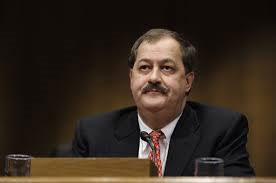You can feel the tremors reverberating through Big Coal, not from blasting the tops of off mountains, but because one of its leaders is being brought to justice.
Last week, Don Blankenship, former CEO of Massey Energy, was indicted on charges that could put him behind bars for 30 years. Although he’ll probably find a way to wiggle out of it, he’s being charged for willfully violating federal mine safety rules that resulted in 29 deaths at Upper Big Branch Mine.
If you will remember, in 2010, the West Virginia explosion was the worst coal-mining disaster in 40 years, and Blankenship suddenly retired just months later.

The case gives us some insight into why federal regulations are so necessary:
Blankenship is indicted for ignoring basic worker safety rules that would have prevented the disaster. What started as a minor accident ended up blasting through two miles of underground tunnels. Why? Because of a deadly combination. Coal dust – which is extremely explosive – was allowed to accumulate and there wasn’t adequate ventilation, says the jury.
Even worse, he "led a conspiracy to cover up mine safety violations and hinder federal enforcement efforts by providing advance warning of government inspections," reports The Charleston Gazette. He knew there were hundreds of safety violations a year, says the jury in its 4-count indictment.
But he fostered and perpetuated these practices, says the jury, "to produce more coal, avoid the costs of following safety laws, and make more money."
For example, in 2009, a federal inspector measured ventilation levels in one area of the mine at 147 cubic feet per minute when 9,000 cubic feet was required. In 2010, just months before the blast, an inspector found coal dust along the entire length of the conveyor belt that carries coal out of the mine, reports the Gazette.
"We can’t bring back the towns he destroyed, the lives he took, the mountains he flattened, the rivers he poisoned, but there is some consolation in knowing that he’s getting what he deserves," says Robert Kennedy Jr., president of Waterkeeper Alliance.
In March, Alpha Natural Resources, which now owns Massey Coal, settled with the EPA for a $27 million slap on the wrist and $200 million in clean-up efforts. No wonder coal companies aren’t afraid to break the law.
Alpha, the third largest coal company, has almost 6300 violations where pollution from mountaintop mining spewed uncontrolled into streams and rivers. The $200 million will pay for wastewater treatment systems and system-wide upgrades that reduce the amount of pollution that’s allowed to flow from the 79 coal mines across Appalachia.
Black Lung Is Back
And what about all that coal dust that’s left in mines? Last year, more coal miners died from inhaling it (black lung) than in the 2010 blowout, according to the Centers for Disease Control – a disease previously thought to be under control.
In 1969, Congress passed mine safety legislation to eliminate black lung – making sure miners breathed more fresh air and that water sprays were used to keep tunnels free of coal dust. For the next 20 years, the disease dropped off dramatically, but it’s been rebounding for the past decade or so, reports Yale Environment 360, suspiciously coinciding with declining profits.
Since around 2000, Appalachian coal has faced tough competition from natural gas and mines in Wyoming and elsewhere, and companies have been cutting corners to boost profits, says Ken Ward, who has covered the industry for The Charleston Gazette for 23 years.
This year, the industry (and Republicans) are fighting off long-awaited EPA reforms of coal dust rules, after managing to postpone them for years. EPA already backed off from cutting dust limits in half – what scientists believe is necessary – but the industry could still mount a legal challenge, says Ward.
Any attempt to regulate the industry is part of the "War on Coal," with even a stranglehold on the very voters who could lose their lives from these policies.
